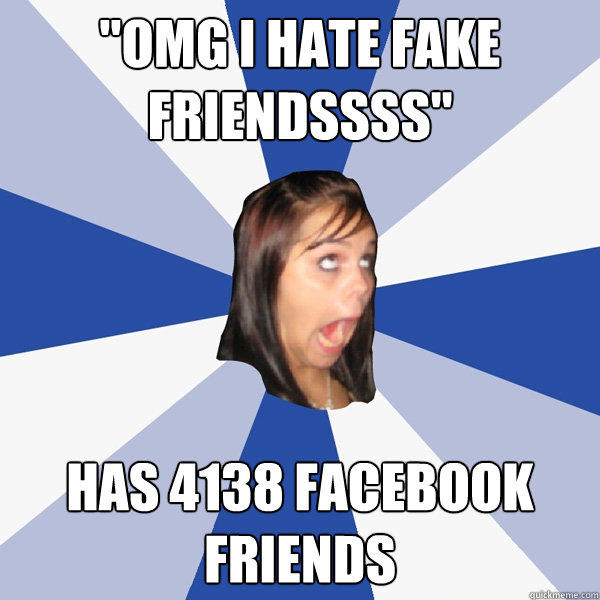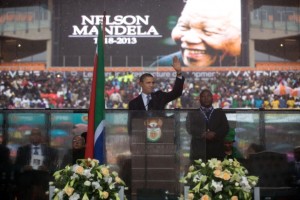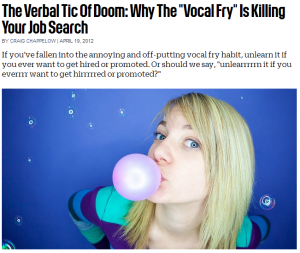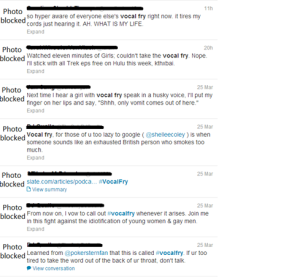In the last post, I discussed the controversy created by the fake sign language interpreter at Mandela’s funeral. This situation, along with many others, constitutes language discrimination.
Language discrimination is basically what it sounds like; it’s when people discriminate against other people based on the way they talk (or sign). Language discrimination is closely tied to other forms of discrimination: racism, sexism, classism, heterosexism, ableism, etc. In some ways, language is used as a proxy for these other types of discrimination.
The picture below an example of how language is used to reinforce negative stereotypes about African-Americans. The character in the picture is white, so language is used both to give the impression that the character is non-white, despite appearances, and to mock the speech of “ghetto” people. The language becomes a tool of racism and classism.

There are many, many examples like this on the web. Here is an example of sexist language discrimination:

Setting aside the accuracy of the language for the targeted groups, you start to wonder why this type of discrimination seems widely acceptable, even among supposedly progressive-minded young people. One major reason for this acceptance is what linguists call Standard Language Ideology. Standard Language Ideology is the idea that there is one “real,” abstract, idealized form of English. Written language is “good” language, and written language closely mirrors the speech of the upper middle class white speakers who are in charge of standardization. Standardization is not some beautiful, flawless system. There are no respected scientists who got together to do an experiment to find out which is the best, clearest, and most logical form of English and — voila! — we have the perfect written language enforced by grammar Nazis everywhere. The choosing of the standard dialect, linguistically, is arbitrary; no one dialect is “better” than another. The same pool of wealthy white people who make decisions on virtually all things important got together and decided their way was best. If a group of rural West Virginians were in power, we would have happily adopted their dialect as the standard, double negatives and all.
The same progressive-minded young people who proudly sport their Human Rights Campaign equal-sign bumper stickers are often also the upper middle class white people who place a lot of value on a quality education. Most American high schools teach English language and literature, where the idealization of the standard dialect is a major focus. With that idealization, there is often frequent denigration of non-standard varieties – even while many of them also praise Mark Twain for using “realistic” language! Good students will tend to follow the example of their English teachers and a proliferation of pins like these show up on Pinterest:

Enthusiasm for the standard dialect is also augmented by the structural inequalities in the system. If you speak a variety close to the standard at home, as many self-proclaimed grammar enthusiasts do, then school reinforces the idea of the inherent superiority of the middle and upper classes. In many places, it is socially unacceptable for someone to say “I am better than you because I am rich and you are poor,” but it doesn’t seem as bad to say “Why can’t you speak real English like I can?” In fact, the two sentences are not so different in their underlying meaning. That sentiment is an example of privilege: what one person may have spoken from birth, another has to learn explicitly, often with little or no support from the school system. The school system is aggressive about using the standard language, of course, but in general people who speak non-standard dialects are not taught to “translate” into Standard English.
Furthermore, when you mock “ghetto” speech like the imagined dialogue of “Draquesha,” you can say you are not being racist, that you’re simply defending correct speech. You don’t lack respect for African-Americans, you just have so much respect for the English language that you hate to see it “ruined.” Similarly, when you complain about the use of “like,” uptalk or vocal fry, you’re not being sexist (even though you specifically call out young girls alone for using it, even when that is not the case), you just hate to see people using our language in such an “idiotic” way.
Although I have made school out to be the “bad guy”, there is some good news about English teachers and decreasing language discrimination: there are now many teachers who are making an effort to promote language diversity and respect for all dialects. These teachers realize that language discrimination is as bad as any other kind, and they see that it both hurts students’ chances for improvement in written English and increases the education gap between the privileged and the non-privileged.
Drs. Anne Charity Hudley and John Rickford are two linguists working with those educators to change the way we treat children with non-standard dialects in the classroom. Charity Hudley and Rickford have worked tirelessly with educators to increase awareness of linguistic diversity and to implement that increased awareness in the classroom. You can hear about their work on the podcast “With Good Reason.”
If you want to avoid language discrimination in your own life, start by thinking twice about what you say and what you post on social media. Ask yourself: why do people find “Draquesha” funny? Is there a more sinister message underlying the language used in a joke? If a joke makes fun of “real” language used by real people, chances are the joke falls under the category of language discrimination. If you want to see grammar manipulated for the purpose of humor that is linguist-guaranteed to not be language discrimination, I highly recommend the doge meme.




